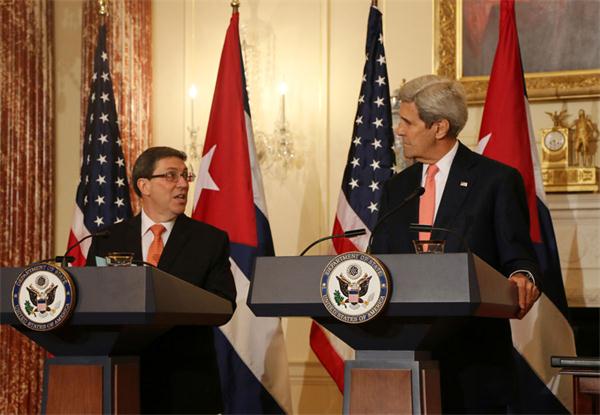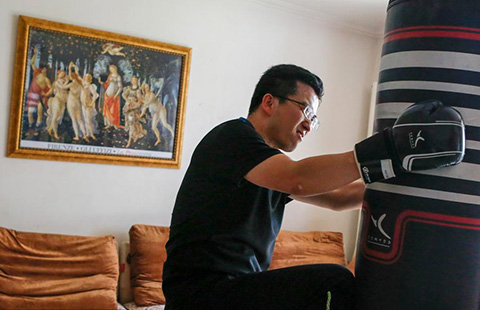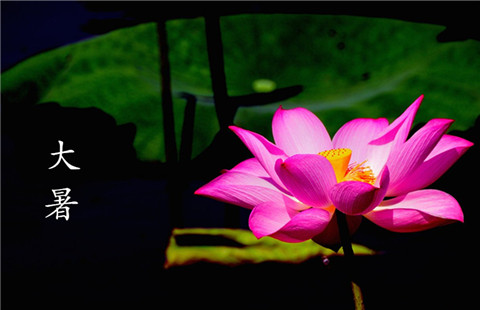Making sense of the reestablishment of US-Cuba ties
Updated: 2015-07-24 07:52
By Chen Weihua(China Daily)
|
||||||||
 |
|
Cuban Foreign Minister Bruno Rodriguez (left) and US Secretary of State John Kerry speak at a press conference at the US State Department in Washington on July 20 when the two countries officially re-established their diplomatic ties. Chen Weihua/China Daily |
I was one of the about 800 people who gathered on Monday morning inside and outside the new Cuban embassy in Washington to observe the flag-raising ceremony as the United Stated and Cuba officially re-established diplomatic ties.
It was a historic moment, but one was forced to think why the historical animosity had lasted 54 years and more than 20 years since the end of the Cold War. The crowds on Monday were celebrating the new relationship, but most of the banners they held called for an end to US economic and trade embargo on Cuba and the return of the Cuban territory of Guantanamo, now occupied by the US and the site of a US naval base, including a notorious detention center, to Havana.
Cuban Foreign Minister Bruno Rodriguez declared that the historic restoration of diplomatic ties will only make sense if the US lifts its sanctions against and returns Guantanamo to Cuba. The United Nations General Assembly has passed a resolution every year since 1992 condemning the embargo, calling it a violation of the UN Charter and international law.
The US has been clearly on the wrong side of history far too long, not just on the embargo, but also in terms of its many attempts over the decades to try to assassinate former Cuban president Fidel Castro and overthrow the Cuban government.
But many American politicians have turned a deaf ear to the loud international outcry and instead chosen to continue living in the Cold War. The embargo has not only inflicted huge sufferings on the 11 million Cuban people, it has also been a punishment for US citizens who have been denied the freedom to travel as tourist to the beautiful island nation only 145 kilometers from Key West in Florida.
In their speeches, US President Barack Obama and Secretary of State John Kerry have acknowledged that the embargo and the efforts to isolate Cuba have not worked; rather they have made the US more isolated, especially in Latin America. But it took six long years for the Obama administration to spell out the truth.
Obama has urged the US Congress to lift the embargo. But that is unlikely to happen any time soon given the strong opposition from Republican lawmakers. These lawmakers have been acting against the will of their constituents, as a Pew Center survey released on Tuesday showed that 73 percent of Americans approve of the re-establishment of diplomatic ties and 72 percent want the US to lift its trade embargo. Both figures are higher than in previous surveys.
However, on the issue of Guantanamo, the Obama administration continues to say that it has no intention of returning the Cuban territory to Havana. This only means that while the US tries to claim the moral high ground by pointing fingers at other countries over territorial disputes, it does not apply the same policy to shame itself for occupying a foreign land based on past unequal treaties, which only smacks of colonialism.
While the rest of the world treated the restoration of US-Cuban diplomatic ties as the top news of the day, US cable networks devoted most of their air time to Republican presidential candidate Donald Trump's surge in the polls, something that should have been the top subject of the Comedy Central channel.
Surprisingly, US media outlets have not dedicated any program to introduce today's Cuba, its people, culture and history to the American public, except highlighting the diatribe of some conservative American politicians.
Like the past more than two decades, the US news media are not likely to cover the condemnation of the US embargo on Cuba in the UN General Assembly in September, the 24th time in as many years.
This blindness is truly exceptional, but hopefully it is not part of the exceptionalism that many Americans use to define their country.
The author, based in Washington, is deputy editor of China Daily USA. chenweihua@chinadailyusa.com

 Unusual but true: 'Love' conquers all
Unusual but true: 'Love' conquers all
 Six dead as rainstorms wreak havoc in China
Six dead as rainstorms wreak havoc in China
 Guangzhou Evergrande stun Bayern in penalty shootout
Guangzhou Evergrande stun Bayern in penalty shootout
 10 domestic films to see this summer
10 domestic films to see this summer
 Tricks airports use to scare away birds
Tricks airports use to scare away birds
 The highs and lows of a stock market investor
The highs and lows of a stock market investor
 Culture insider: 7 things you may not know about Major Heat
Culture insider: 7 things you may not know about Major Heat
 Future of Great Wall in Hebei province looks bleak
Future of Great Wall in Hebei province looks bleak
Most Viewed
Editor's Picks

|

|

|

|

|

|
Today's Top News
Astronomers discover most Earth-like planet yet
Flight details of Obama's Kenya trip leaked
2 killed, several injured in Louisiana theater shooting
Deficit hits $104b in first half
Obama to meet extended family members in Kenya
More Chinese companies become world top 500
Earth-like planet discovered using NASA's Kepler space telescope
Ministry denies set date for nationwide two-child policy
US Weekly

|

|







